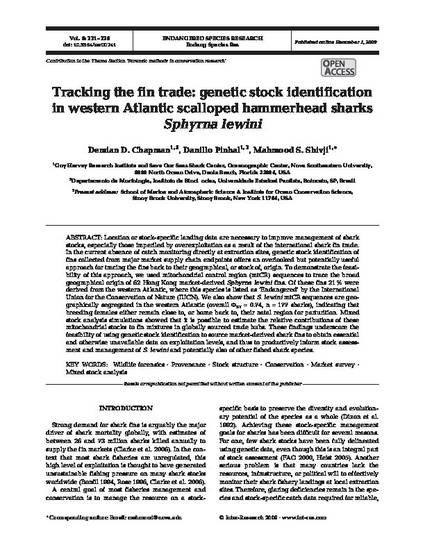
- Wildlife forensics,
- Provenance,
- Stock structure,
- Conservation,
- Market survey,
- Mixed stock analysis
Location or stock-specific landing data are necessary to improve management of shark stocks, especially those imperiled by overexploitation as a result of the international shark fin trade. In the current absence of catch monitoring directly at extraction sites, genetic stock identification of fins collected from major market supply chain endpoints offers an overlooked but potentially useful approach for tracing the fins back to their geographical, or stock of, origin. To demonstrate the feasibility of this approach, we used mitochondrial control region (mtCR) sequences to trace the broad geographical origin of 62 Hong Kong market-derived Sphyrna lewini fins. Of these fins 21% were derived from the western Atlantic, where this species is listed as ‘Endangered’ by the International Union for the Conservation of Nature (IUCN). We also show that S. lewini mtCR sequences are geographically segregated in the western Atlantic (overall ΦST = 0.74, n = 177 sharks), indicating that breeding females either remain close to, or home back to, their natal region for parturition. Mixed stock analysis simulations showed that it is possible to estimate the relative contributions of these mitochondrial stocks to fin mixtures in globally sourced trade hubs. These findings underscore the feasibility of using genetic stock identification to source market-derived shark fins to obtain essential and otherwise unavailable data on exploitation levels, and thus to productively inform stock assessment and management of S. lewini and potentially also of other fished shark species.
Journal Cover Article.
Research received extensive worldwide media coverage including in: Science News, Discovery, National Geographic, Miami Herald, Florida Sun-Sentinel
Available at: http://works.bepress.com/mahmood-shivji/2/

©2009 Inter-Research